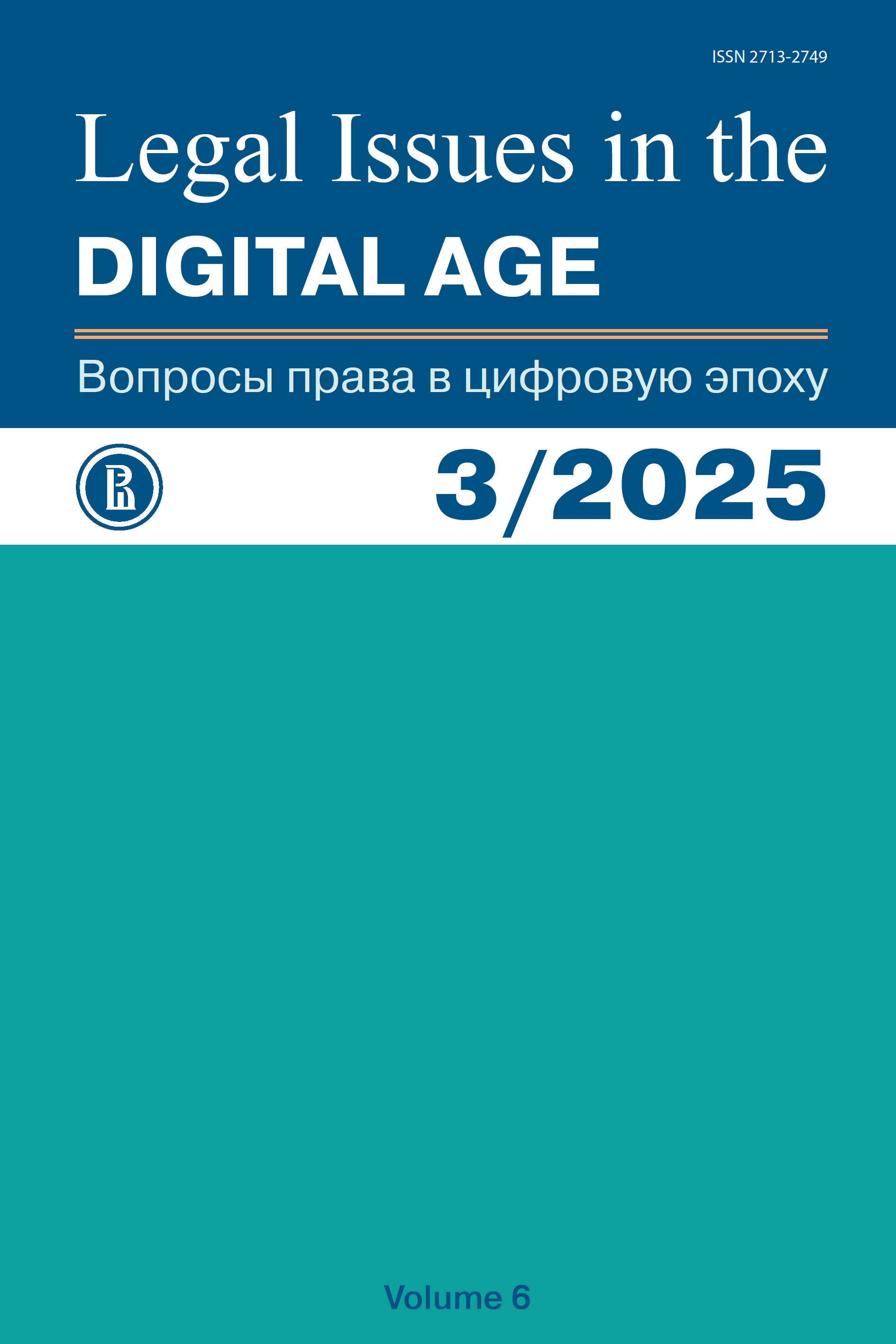Challenges and Prospects for Legal Regulation of Working Time (Connection Time) for Digital Platform Workers
Abstract
Digital platforms, transforming the labour market through crowdsourcing and multitasking, create legal challenges in regulating of working time, exacerbated by the inefficacy of traditional labour legislation. The formal autonomy of self-employed platform workers masks algorithmic control, where the absence of fixed shifts (slots) coexists with dependence on platform prescriptions and algorithms. The legal ambiguity of working time on digital platforms, which conflates active work with periods of online availability, leaves workers unprotected against digital control that disguises exploitation as market flexibility. To address the problems of platform-based work distribution and the practical inefficacy of classical regulatory approaches, the theoretical concept of connection time is proposed in the article. Unlike zero-hour contract, that masks the absence of guarantees through flexibility, and traditional normative limits on working hours, inapplicable to platform employment, connection time offers an alternative by integrating active and passive modes of online availability into a unified legal framework. Within this concept, the mere act of connecting to a platform is recognized as creating a mandatory measure of labour that restricts worker autonomy. Active connection time, linked to task performance, is governed by duration limits and payment guarantees, while passive connection time (waiting for orders, maintaining ratings, readiness for tasks) is acknowledged as labour activity requiring compensation for readiness, that restricts personal autonomy. The concept of connection time addresses the issue of multi-platform work as a phenomenon increasing risks of workplace accidents and occupational diseases. The proposed legal innovations are insufficient without a technological approach: states must implement algorithmic regulation and monitoring systems to automate control over connection time. Institutionalizing connection time will transform abstract norms into enforceable rules, eliminating risk asymmetry between platforms and workers, while establishing the state’s regulatory authority in platform employment.
References
Adams-Prassl A., Freedland M.R., Adams-Prassl J. (2015) The Zero-Hours Contract: Regulating Casual Work, or Legitimating Precarity? Oxford Legal Studies Research Paper, vol. 11, pp. 1–21. Available at: URL: https://ssrn.com/abstract=2507693 (accessed: 08.03.2025)
Adams-Prassl J. (2018) Humans as a Service: The Promise and Perils of Work in the Gig Economy. New York: Oxford University Press, 208 p.
Boulin J.-Y., Lallement M. et al. (2006) Decent Working Time: New Trends, New Issues. Geneva: International Labour Organization, 464 p. Available at: URL: https://researchrepository.ilo.org/esploro/outputs/book/Decent-working-time-new-trends-new/995374893102676 (accessed: 08.03.2025)
Collins H., Ewing K., McColgan A. (2012) Labour Law. Cambridge: University Press, 1024 p.
Deakin S., Morris G. (2012) Labour Law. Oxford: Hart Publishing, 1360 p.
Fabrellas A.G. (2019) The Zero-hour Contract in Platform Work. Should We Ban It or Embrace It? IDP: Revista de Internet, Derecho y Politica, vol. 28, no. 1, pp. 1–15.
Friedmann S. (1997) Labour Law in Flux: The Changing Composition of the Workforce. Industrial Law Journal, vol. 26, no. 4, pp. 337–352.
Jaehrling K., Kalina T. (2020) «Grey Zones» Within Dependent Employment: Formal and Informal Forms of On-call Work in Germany. European Review of Labour and Research, vol. 26, pp. 447–463.
Kiselev I.Ya. (2002) The New Face of Labour Law in Western Countries (Breakthrough into Post-Industrial Society). Upravlenie personalom=Management of Personnel, no. 4, pp. 49–55 (in Russ.)
Motina E.V. (2024) Semantic Criteria of the “Zero Hours” Contract and the Contours of Their Fixation in Labour Law. In: Public and Private Principles of Legal Regulation in a Modern Social State: Collection of Articles of Conference with International Participation. 2023. Minsk: University, pp. 241–244 (in Russ.) Available at: URL: http://edoc.bseu.by:8080/bitstream/edoc/102382/1/Motina_241_244.pdf (accessed: 08.03.2025)
O’Sullivan M. (2019) Introduction to Zero Hours and On-call Work in Anglo-Saxon Countries. In: Zero Hours and On-call Work in Anglo-Saxon Countries, pp. 1–20. Available at: URL: https://link.springer.com/chapter/10.1007/978-981-13-6613-0_1 (accessed: 08.03.2025)
Protsevskiy A.I. (1975) Wages and Efficiency of Social Production. Kharkov: Vysshaya Shkola, 168 p. (in Russ.)
Protsevskiy A.I. (1963) Working Time and Working Day under Soviet Labour Law. Moscow: Gosyurizdat, 182 p. (in Russ.)
Santos M.F., Siqueira J.S. et al. (2025) Mental Disorders Related to Psychosocial Factors Among Delivery Workers: Results of a Web Survey in Brazil. International Archives of Occupational and Environmental Health, vol. 98, pp. 99–107.
Sinyavskaya O.V., Biryukova S.S. et al. (2021) Platform Employment: Definition and Regulation. Moscow: HSE Publishing House, 78 p. (in Russ.) Available at: URL: https://publications.hse.ru/books/664938838 (accessed: 10.03.2025)
Sinyavskaya O.V., Biryukova S.S. et al. (2024) Platform Employment in Russia: Dynamics of Prevalence and Key Characteristics of Workers (A Report). Moscow: HSE Publishing House, 64 p. (in Russ.) Available at: URL: https://publications.hse.ru/books/936765274 (accessed: 10.03.2025)
Srnicek N. (2017) The Platform Capitalism. Cambridge (UK): Polity Press, 120 p. Available at: URL: https://mudancatecnologicaedinamicacapitalista.wordpress.com/wp-content/uploads/2019/02/platform-capitalism.pdf (accessed: 08.03.2025)
Standing G. (2011) The Precariat: The New Dangerous Class. London: Bloomsbury Academic, 198 p. Available at: URL: https://www.hse.ru/data/2013/01/28/1304836059/Standing.%20The_Precariat__The_New_Dangerous_Class__-Bloomsbury_USA(2011).pdf (accessed: 08.03.2025)
Wang Q., Chen Y., Yang Y. (2024) Unpacking the Legal Status of Platform Workers in China: An Empirical Analysis of Judicial Attitudes and Challenges in the Food Delivery Sector. Asia Pacific Law Review, vol. 32, no. 1, pp. 149–171. Available at: URL: https://www.tandfonline.com/doi/full/10.1080/10192557.2023.2233222 (accessed: 08.03.2025)
Yoo H., Yang M. et al. (2024) Investigation of Working Conditions and Health Status in Platform Workers in the Republic of Korea. Safety and Health at Work, vol. 15, no. 1, pp. 17–23. Available at: URL: https://www.sciencedirect.com/science/article/pii/S2093791124000027?via%3Dihub (accessed: 08.03.2025)
Copyright (c) 2025 Novikov D.A.

This work is licensed under a Creative Commons Attribution-ShareAlike 4.0 International License.
Authors who publish with this journal agree to the Licensing, Copyright, Open Access and Repository Policy.









